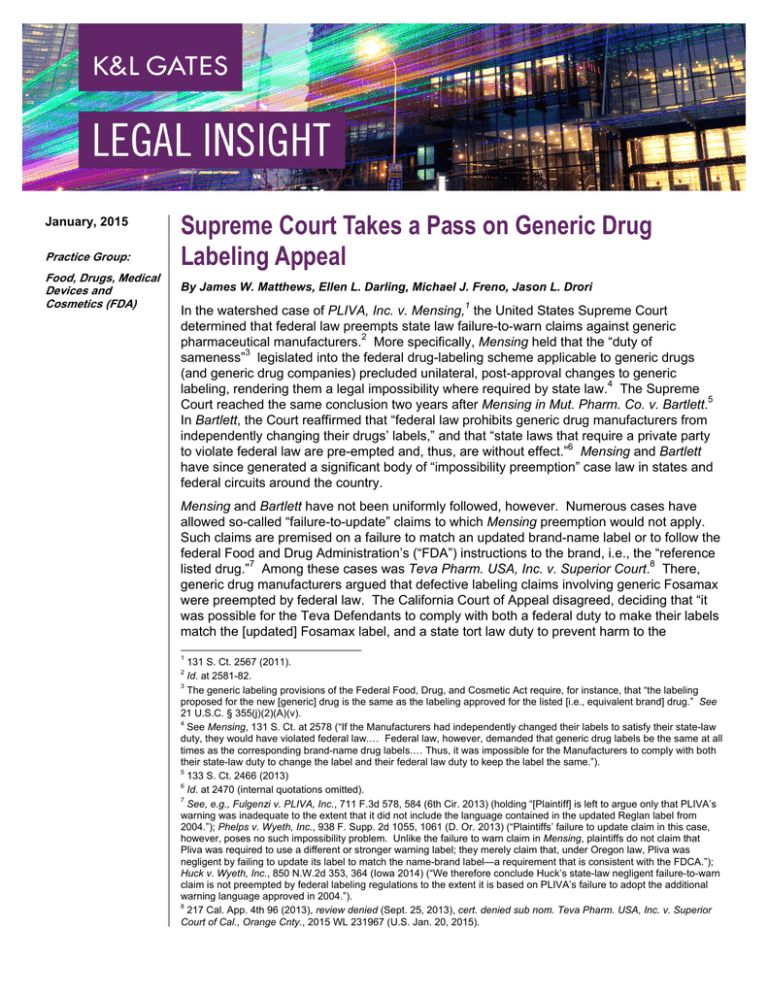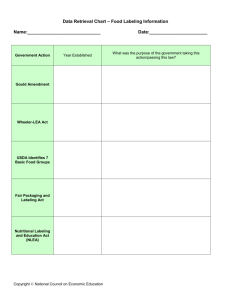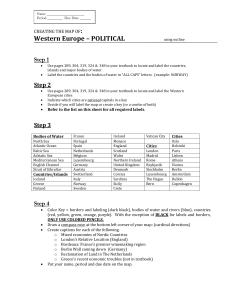
January, 2015
Practice Group:
Food, Drugs, Medical
Devices and
Cosmetics (FDA)
Supreme Court Takes a Pass on Generic Drug
Labeling Appeal
By James W. Matthews, Ellen L. Darling, Michael J. Freno, Jason L. Drori
In the watershed case of PLIVA, Inc. v. Mensing,1 the United States Supreme Court
determined that federal law preempts state law failure-to-warn claims against generic
pharmaceutical manufacturers.2 More specifically, Mensing held that the “duty of
sameness”3 legislated into the federal drug-labeling scheme applicable to generic drugs
(and generic drug companies) precluded unilateral, post-approval changes to generic
labeling, rendering them a legal impossibility where required by state law.4 The Supreme
Court reached the same conclusion two years after Mensing in Mut. Pharm. Co. v. Bartlett.5
In Bartlett, the Court reaffirmed that “federal law prohibits generic drug manufacturers from
independently changing their drugs’ labels,” and that “state laws that require a private party
to violate federal law are pre-empted and, thus, are without effect.”6 Mensing and Bartlett
have since generated a significant body of “impossibility preemption” case law in states and
federal circuits around the country.
Mensing and Bartlett have not been uniformly followed, however. Numerous cases have
allowed so-called “failure-to-update” claims to which Mensing preemption would not apply.
Such claims are premised on a failure to match an updated brand-name label or to follow the
federal Food and Drug Administration’s (“FDA”) instructions to the brand, i.e., the “reference
listed drug.”7 Among these cases was Teva Pharm. USA, Inc. v. Superior Court.8 There,
generic drug manufacturers argued that defective labeling claims involving generic Fosamax
were preempted by federal law. The California Court of Appeal disagreed, deciding that “it
was possible for the Teva Defendants to comply with both a federal duty to make their labels
match the [updated] Fosamax label, and a state tort law duty to prevent harm to the
1
131 S. Ct. 2567 (2011).
Id. at 2581-82.
3
The generic labeling provisions of the Federal Food, Drug, and Cosmetic Act require, for instance, that “the labeling
proposed for the new [generic] drug is the same as the labeling approved for the listed [i.e., equivalent brand] drug.” See
21 U.S.C. § 355(j)(2)(A)(v).
4
See Mensing, 131 S. Ct. at 2578 (“If the Manufacturers had independently changed their labels to satisfy their state-law
duty, they would have violated federal law.… Federal law, however, demanded that generic drug labels be the same at all
times as the corresponding brand-name drug labels.… Thus, it was impossible for the Manufacturers to comply with both
their state-law duty to change the label and their federal law duty to keep the label the same.”).
5
133 S. Ct. 2466 (2013)
6
Id. at 2470 (internal quotations omitted).
7
See, e.g., Fulgenzi v. PLIVA, Inc., 711 F.3d 578, 584 (6th Cir. 2013) (holding “[Plaintiff] is left to argue only that PLIVA’s
warning was inadequate to the extent that it did not include the language contained in the updated Reglan label from
2004.”); Phelps v. Wyeth, Inc., 938 F. Supp. 2d 1055, 1061 (D. Or. 2013) (“Plaintiffs’ failure to update claim in this case,
however, poses no such impossibility problem. Unlike the failure to warn claim in Mensing, plaintiffs do not claim that
Pliva was required to use a different or stronger warning label; they merely claim that, under Oregon law, Pliva was
negligent by failing to update its label to match the name-brand label—a requirement that is consistent with the FDCA.”);
Huck v. Wyeth, Inc., 850 N.W.2d 353, 364 (Iowa 2014) (“We therefore conclude Huck’s state-law negligent failure-to-warn
claim is not preempted by federal labeling regulations to the extent it is based on PLIVA’s failure to adopt the additional
warning language approved in 2004.”).
8
217 Cal. App. 4th 96 (2013), review denied (Sept. 25, 2013), cert. denied sub nom. Teva Pharm. USA, Inc. v. Superior
Court of Cal., Orange Cnty., 2015 WL 231967 (U.S. Jan. 20, 2015).
2
Supreme Court Takes a Pass on Generic Drug Labeling
Appeal
consumers of alendronate sodium.”9 Accordingly, it ruled that if “the Teva Defendants failed
to update the labels of their alendronate sodium products to match the RLD label after the
manufacturer of brand-name Fosamax updated its label[,] [t]hese allegations are sufficient to
state a cause of action based on the failure to update the warning labels, and the causes of
action based on the failure to update the generic labels’ warnings are not preempted.”10
On February 7, 2014, Teva Pharmaceuticals USA, Inc., Barr Laboratories, Inc., and Caraco
Pharmaceutical Laboratories, Ltd. filed a petition for Supreme Court review, seeking to
“definitively resolve the direct conflict among the state and federal appellate courts over the
generic industry’s exposure to private litigation predicated on allegations that generic drug
manufacturers violated federal law.”11 The federal government weighed in with an amicus
brief filed December 16, 2014, in which the solicitor general discouraged review as both
procedurally improper and otherwise unwarranted and premature “in light of pending FDA
regulatory changes … that would enable ANDA holders to update product labeling promptly
to reflect certain types of newly acquired information related to drug safety, irrespective of
whether the revised labeling differs from that of the [equivalent brand].…”12 On January 20,
2015, the Supreme Court denied review without comment.13
The denial leaves intact a growing split of authority and refocuses attention on the FDA’s
controversial proposed generic drug labeling rule, on which K&L Gates first reported in
November 2013.14 The FDA has delayed publication of the final generic rule to fall 2015 in
order to allow for review of the 110-plus public comments the agency has received.
Authors:
James W. Matthews
james.matthews@klgates.com
+1. 617.261.3197
Ellen L. Darling
ellen.darling@klgates.com
+1. 949.623.3540
Michael J. Freno
michael.freno@klgates.com
+1. 206.370.7947
Jason L. Drori
jason.drori@klgates.com
+1. 617.951.9143
9
Id. at 107.
Id. at 108.
11
See Petition for Writ of Certiorari, 2014 WL 547055, at *2 (2014).
12
See Brief for the United States as Amicus Curiae, 2014 WL 7169712, at *23 (2014).
13
Teva Pharm. USA, Inc. v. Superior Court of Cal., Orange Cnty., 2015 WL 231967, at *1 (U.S. Jan. 20, 2015).
14
See FDA Alert, http://www.klgates.com/files/Publication/d7d0253f-0dfb-40f0-b751916f36d6e7bc/Presentation/PublicationAttachment/fb11e317-90d8-41da-adb32332ae8c9da5/New_FDA_Rule_Drug_Labeling.pdf.
10
2
Supreme Court Takes a Pass on Generic Drug Labeling
Appeal
Anchorage Austin Beijing Berlin Boston Brisbane Brussels Charleston Charlotte Chicago Dallas Doha Dubai Fort Worth Frankfurt
Harrisburg Hong Kong Houston London Los Angeles Melbourne Miami Milan Moscow Newark New York Orange County Palo Alto Paris
Perth Pittsburgh Portland Raleigh Research Triangle Park San Francisco São Paulo Seattle Seoul Shanghai Singapore Spokane
Sydney Taipei Tokyo Warsaw Washington, D.C. Wilmington
K&L Gates comprises more than 2,000 lawyers globally who practice in fully integrated offices located on five
continents. The firm represents leading multinational corporations, growth and middle-market companies, capital
markets participants and entrepreneurs in every major industry group as well as public sector entities, educational
institutions, philanthropic organizations and individuals. For more information about K&L Gates or its locations,
practices and registrations, visit www.klgates.com.
This publication is for informational purposes and does not contain or convey legal advice. The information herein should not be used or relied upon in
regard to any particular facts or circumstances without first consulting a lawyer.
© 2015 K&L Gates LLP. All Rights Reserved.
3



